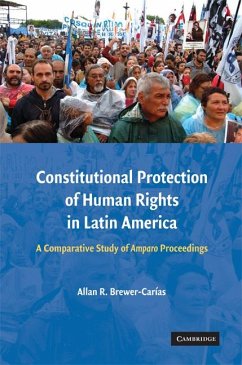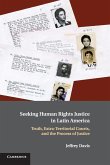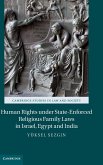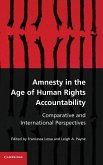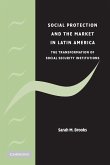Allan. R. Brewer-Carias
Constitutional Protection of Human Rights in Latin America
Allan. R. Brewer-Carias
Constitutional Protection of Human Rights in Latin America
- Gebundenes Buch
- Merkliste
- Auf die Merkliste
- Bewerten Bewerten
- Teilen
- Produkt teilen
- Produkterinnerung
- Produkterinnerung
This book examines trends in the constitutional and legal regulations in all Latin American countries regarding the amparo proceedings.
Andere Kunden interessierten sich auch für
![Human Rights in the Constitutional Law of the United States Human Rights in the Constitutional Law of the United States]() Michael PerryHuman Rights in the Constitutional Law of the United States86,99 €
Michael PerryHuman Rights in the Constitutional Law of the United States86,99 €![Seeking Human Rights Justice in Latin America Seeking Human Rights Justice in Latin America]() Jeffrey DavisSeeking Human Rights Justice in Latin America40,99 €
Jeffrey DavisSeeking Human Rights Justice in Latin America40,99 €![Seeking Human Rights Justice in Latin America Seeking Human Rights Justice in Latin America]() Jeffrey DavisSeeking Human Rights Justice in Latin America115,99 €
Jeffrey DavisSeeking Human Rights Justice in Latin America115,99 €![Human Rights Under State-Enforced Religious Family Laws in Israel, Egypt and India Human Rights Under State-Enforced Religious Family Laws in Israel, Egypt and India]() Y. Ksel SezginHuman Rights Under State-Enforced Religious Family Laws in Israel, Egypt and India106,99 €
Y. Ksel SezginHuman Rights Under State-Enforced Religious Family Laws in Israel, Egypt and India106,99 €![Amnesty in the Age of Human Rights Accountability Amnesty in the Age of Human Rights Accountability]() Amnesty in the Age of Human Rights Accountability99,99 €
Amnesty in the Age of Human Rights Accountability99,99 €![Theoretical Boundaries of Armed Conflict and Human Rights Theoretical Boundaries of Armed Conflict and Human Rights]() Theoretical Boundaries of Armed Conflict and Human Rights48,99 €
Theoretical Boundaries of Armed Conflict and Human Rights48,99 €![Social Protection and the Market in Latin America Social Protection and the Market in Latin America]() Sarah M. BrooksSocial Protection and the Market in Latin America28,99 €
Sarah M. BrooksSocial Protection and the Market in Latin America28,99 €-
-
-
This book examines trends in the constitutional and legal regulations in all Latin American countries regarding the amparo proceedings.
Hinweis: Dieser Artikel kann nur an eine deutsche Lieferadresse ausgeliefert werden.
Hinweis: Dieser Artikel kann nur an eine deutsche Lieferadresse ausgeliefert werden.
Produktdetails
- Produktdetails
- Verlag: Cambridge University Press
- Seitenzahl: 450
- Erscheinungstermin: 9. April 2009
- Englisch
- Abmessung: 235mm x 157mm x 29mm
- Gewicht: 798g
- ISBN-13: 9780521492027
- ISBN-10: 0521492025
- Artikelnr.: 24927466
- Herstellerkennzeichnung
- Books on Demand GmbH
- In de Tarpen 42
- 22848 Norderstedt
- info@bod.de
- 040 53433511
- Verlag: Cambridge University Press
- Seitenzahl: 450
- Erscheinungstermin: 9. April 2009
- Englisch
- Abmessung: 235mm x 157mm x 29mm
- Gewicht: 798g
- ISBN-13: 9780521492027
- ISBN-10: 0521492025
- Artikelnr.: 24927466
- Herstellerkennzeichnung
- Books on Demand GmbH
- In de Tarpen 42
- 22848 Norderstedt
- info@bod.de
- 040 53433511
Law Degree (Summa Cum Laude) (1962) and Doctor of Laws (1964), Central University of Venezuela. Since 1963 he has been Professor at the Central University of Venezuela. He was the Director of the Public Law Institute at the same University (1978-89), and has been Professor in post-graduate courses in the Law Faculties at the University of Cambridge (LLM), UK; the University of Paris II; the University of Rosario and the University Extern ado of Colombia in Bogotá. In 2006 and 2007, he has been Adjunct Professor of Law at the Columbia Law School, University of Columbia, New York. In 1981 he was awarded with the National Sciences Prize of Venezuela, for his achievements in law and institutional studies. He is a Vice-President of the International Academy of Comparative Law (The Hague); a Member of the Board of Directors of the Inter-American Institute of Human Rights; and a Member of the Venezuelan National Academy of Political and Social Sciences, where he served as President in 1997-9. In Venezuela, he has been Senator for the Federal District; Head of the Presidential Commission on Administrative Reform and Minister for Decentralization; and was elected Member of the National Constituent Assembly in 1999. Since 1980, he has been the Director of the Public Law Journal (Revista de Derecho Público) of Venezuela and has extensively published books and articles on constitutional and administrative law. Cambridge University Press published his 1985 book, Judicial Review in Comparative Law. Since 1974 he has been a Partner of the law firm Baumeister & Brewer in Caracas.
Part I. The Constitutional and International Declarations of Human Rights
and Its Judicial Guaranties: 1. The constitutional declarations of human
rights in Latin America and its internationalization; 2. Judicial
guaranties of the declarations of human rights; Part II. The Amparo as a
Latin American Constitutional and International Law Institution: 3.
Judicial review and amparo proceeding in Latin America; 4. The amparo
action in countries that only apply the diffuse system of judicial review
of legislation; 5. The amparo action in countries that only apply the
concentrated method of judicial review of legislation; 6. The amparo as a
constitutional right in countries with mixed systems of judicial review of
legislation; 7. The amparo as a constitutional guaranty in countries with
mixed systems of judicial review of legislation; 8. The American Convention
on Human Rights and the internationalization of the amparo in Latin
America; Part III. The Injured Party and the Constitutional Rights
Protected by Means of the Amparo Proceedings: 9. The injured party: the
plaintiff and the rules of standing; 10. The justiciable constitutional
rights by means of the amparo and habeas corpus actions; 11. The question
of the justiciability of social constitutional rights by means of the
amparo action; Part IV. The Injury, the Injuring Party, and the Injuring
Acts in the Amparo Proceeding: 12. The general conditions of the injury
(harms and threats); 13. The reparable character of the harms and the
restorative character of the amparo proceeding; 14. The imminent character
of the threats and the preventive character of the amparo proceeding; 15.
The injuring party: the defendant (public entities or private individuals);
16. The injuring actions and omissions of public authorities causing the
harm or the threats; Part V. The Extraordinary Character of the Amparo
Proceeding: 17. The question of the admissibility of the amparo and its
relation with the ordinary judicial means; 18. The main principles of the
procedure in the amparo proceeding; 19. The adjective configuration of the
main phases of the amparo proceeding; 20. The adjudication in the amparo
proceeding and the preliminary protective measures; 21. The definitive
judicial adjudication in the amparo suit; 22. The revision of the amparo
decisions by the Constitutional Court or the Supreme Court.
and Its Judicial Guaranties: 1. The constitutional declarations of human
rights in Latin America and its internationalization; 2. Judicial
guaranties of the declarations of human rights; Part II. The Amparo as a
Latin American Constitutional and International Law Institution: 3.
Judicial review and amparo proceeding in Latin America; 4. The amparo
action in countries that only apply the diffuse system of judicial review
of legislation; 5. The amparo action in countries that only apply the
concentrated method of judicial review of legislation; 6. The amparo as a
constitutional right in countries with mixed systems of judicial review of
legislation; 7. The amparo as a constitutional guaranty in countries with
mixed systems of judicial review of legislation; 8. The American Convention
on Human Rights and the internationalization of the amparo in Latin
America; Part III. The Injured Party and the Constitutional Rights
Protected by Means of the Amparo Proceedings: 9. The injured party: the
plaintiff and the rules of standing; 10. The justiciable constitutional
rights by means of the amparo and habeas corpus actions; 11. The question
of the justiciability of social constitutional rights by means of the
amparo action; Part IV. The Injury, the Injuring Party, and the Injuring
Acts in the Amparo Proceeding: 12. The general conditions of the injury
(harms and threats); 13. The reparable character of the harms and the
restorative character of the amparo proceeding; 14. The imminent character
of the threats and the preventive character of the amparo proceeding; 15.
The injuring party: the defendant (public entities or private individuals);
16. The injuring actions and omissions of public authorities causing the
harm or the threats; Part V. The Extraordinary Character of the Amparo
Proceeding: 17. The question of the admissibility of the amparo and its
relation with the ordinary judicial means; 18. The main principles of the
procedure in the amparo proceeding; 19. The adjective configuration of the
main phases of the amparo proceeding; 20. The adjudication in the amparo
proceeding and the preliminary protective measures; 21. The definitive
judicial adjudication in the amparo suit; 22. The revision of the amparo
decisions by the Constitutional Court or the Supreme Court.
Part I. The Constitutional and International Declarations of Human Rights
and Its Judicial Guaranties: 1. The constitutional declarations of human
rights in Latin America and its internationalization; 2. Judicial
guaranties of the declarations of human rights; Part II. The Amparo as a
Latin American Constitutional and International Law Institution: 3.
Judicial review and amparo proceeding in Latin America; 4. The amparo
action in countries that only apply the diffuse system of judicial review
of legislation; 5. The amparo action in countries that only apply the
concentrated method of judicial review of legislation; 6. The amparo as a
constitutional right in countries with mixed systems of judicial review of
legislation; 7. The amparo as a constitutional guaranty in countries with
mixed systems of judicial review of legislation; 8. The American Convention
on Human Rights and the internationalization of the amparo in Latin
America; Part III. The Injured Party and the Constitutional Rights
Protected by Means of the Amparo Proceedings: 9. The injured party: the
plaintiff and the rules of standing; 10. The justiciable constitutional
rights by means of the amparo and habeas corpus actions; 11. The question
of the justiciability of social constitutional rights by means of the
amparo action; Part IV. The Injury, the Injuring Party, and the Injuring
Acts in the Amparo Proceeding: 12. The general conditions of the injury
(harms and threats); 13. The reparable character of the harms and the
restorative character of the amparo proceeding; 14. The imminent character
of the threats and the preventive character of the amparo proceeding; 15.
The injuring party: the defendant (public entities or private individuals);
16. The injuring actions and omissions of public authorities causing the
harm or the threats; Part V. The Extraordinary Character of the Amparo
Proceeding: 17. The question of the admissibility of the amparo and its
relation with the ordinary judicial means; 18. The main principles of the
procedure in the amparo proceeding; 19. The adjective configuration of the
main phases of the amparo proceeding; 20. The adjudication in the amparo
proceeding and the preliminary protective measures; 21. The definitive
judicial adjudication in the amparo suit; 22. The revision of the amparo
decisions by the Constitutional Court or the Supreme Court.
and Its Judicial Guaranties: 1. The constitutional declarations of human
rights in Latin America and its internationalization; 2. Judicial
guaranties of the declarations of human rights; Part II. The Amparo as a
Latin American Constitutional and International Law Institution: 3.
Judicial review and amparo proceeding in Latin America; 4. The amparo
action in countries that only apply the diffuse system of judicial review
of legislation; 5. The amparo action in countries that only apply the
concentrated method of judicial review of legislation; 6. The amparo as a
constitutional right in countries with mixed systems of judicial review of
legislation; 7. The amparo as a constitutional guaranty in countries with
mixed systems of judicial review of legislation; 8. The American Convention
on Human Rights and the internationalization of the amparo in Latin
America; Part III. The Injured Party and the Constitutional Rights
Protected by Means of the Amparo Proceedings: 9. The injured party: the
plaintiff and the rules of standing; 10. The justiciable constitutional
rights by means of the amparo and habeas corpus actions; 11. The question
of the justiciability of social constitutional rights by means of the
amparo action; Part IV. The Injury, the Injuring Party, and the Injuring
Acts in the Amparo Proceeding: 12. The general conditions of the injury
(harms and threats); 13. The reparable character of the harms and the
restorative character of the amparo proceeding; 14. The imminent character
of the threats and the preventive character of the amparo proceeding; 15.
The injuring party: the defendant (public entities or private individuals);
16. The injuring actions and omissions of public authorities causing the
harm or the threats; Part V. The Extraordinary Character of the Amparo
Proceeding: 17. The question of the admissibility of the amparo and its
relation with the ordinary judicial means; 18. The main principles of the
procedure in the amparo proceeding; 19. The adjective configuration of the
main phases of the amparo proceeding; 20. The adjudication in the amparo
proceeding and the preliminary protective measures; 21. The definitive
judicial adjudication in the amparo suit; 22. The revision of the amparo
decisions by the Constitutional Court or the Supreme Court.

